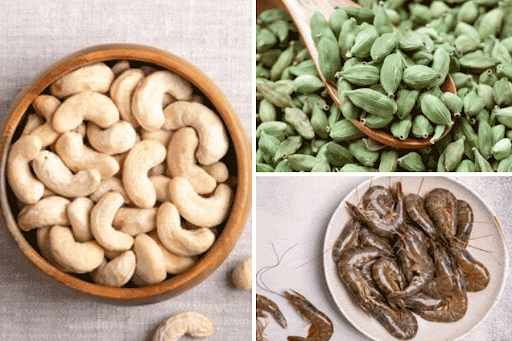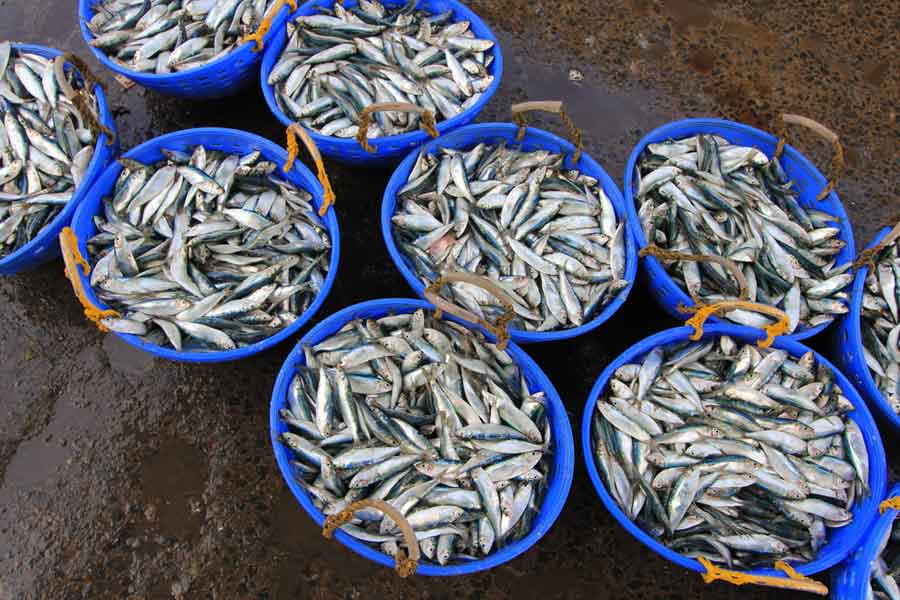Southern states are reeling under the weight of US tariffs, with Kerala’s traditional exports in crisis, Andhra Pradesh seeking urgent relief for its aqua sector, and Tamil Nadu warning that lakhs of jobs in textiles, leather, auto and machinery are at risk.
Kerala’s finance minister K.N.Balagopal has warned that new penalty tariffs could slash revenues, disrupt supply chains and throw thousands of workers...many of them women, out of jobs.
Replying to a calling attention motion in the Assembly on Tuesday, Balagopal said the impact is already rippling across marine products, spices, cashew, coir, tea and rubber, sectors that remain the backbone of Kerala’s economy.
“These tariffs are not just trade barriers. They are creating major economic shocks in Kerala,” Balagopal told legislators.
A preliminary estimate suggests losses between Rs 2,500 crore and Rs 4,500 crore annually, he said.
Marine exports are among the first casualties.
Kerala accounts for 12–13 per cent of India’s seafood exports, with shrimp as its biggest earner.
Washington has raised anti-dumping duties on Indian shrimp from 1.4 per cent to 4.5 per cent, added countervailing duties, and imposed an additional penalty tariff of up to 25 per cent.
“The effective tariff burden now exceeds 33 per cent, making Indian shrimp significantly more expensive in the US market,” Balagopal said. “Orders are being cancelled, stocks are piling up in cold storages and the utilisation of processing plants has slumped below 20 per cent,” he warned.
Women form the majority in shrimp processing units and jobs are now at risk.
The spice trade, which is synonymous with Kerala for centuries, is reeling too.
More than 80 per cent of India’s pepper exports originate from the state, along with cardamom, ginger, spice oils and oleoresins.
Balagopal said the US imports spice products worth over $ 700 million annually. “But duties that could rise in stages to 50 per cent threaten to wipe out Kerala’s competitiveness. Exporters report a six per cent fall in orders since the tariffs were announced, while rivals such as Vietnam and Indonesia are eyeing a larger share of the market,” he said.
Tea, worth about Rs 700 crore in annual exports to the US and rubber are also vulnerable to the shock.
Kerala’s migrant population plays an indirect role in sustaining export industries, and trade disruptions could ripple into migration patterns.
“Income losses in traditional industrial and agricultural sectors may also weaken the state’s human development indicators,” the minister cautioned.
Balagopal outlined short-term measures such as concessional working capital loans, faster IGST refunds, energy subsidies and interim relief for workers. Long-term strategies include diversifying export markets, moving toward rupee-based trade settlements, improving market intelligence, supporting branding and strengthening collective bargaining.
On Monday, Andhra Pradesh Chief Minister N. Chandrababu Naidu urged the Centre’s intervention for the state’s aqua sector. Andhra Pradesh contributes nearly 80 per cent of India’s shrimp exports and 34 per cent of marine exports, valued at Rs 21,246 crore annually.
Naidu said the industry faces losses of around Rs 25,000 crore, with nearly half of export orders cancelled and about 2,000 containers hit with a tariff burden of Rs 600 crore.
Naidu sought a 240-day moratorium on loan and interest repayments, interest subsidies, and a temporary waiver of the 5 per cent GST on frozen shrimp. Relief measures such as price cuts in aqua feed and subsidised transformers have been initiated, but Naidu stressed that central assistance is essential.
Earlier, Tamil Nadu chief minister M.K. Stalin had voiced similar fears.
He warned that “lakhs of jobs in textiles, leather, auto, machinery and other sectors are at risk.”
On X, he urged PM Modi to cut GST on man-made fibres, removing duties on cotton imports, extending low-interest loans and enhancing export incentives. “Tamil Nadu will work closely with the Union Government to overcome this trade crisis,” Stalin said.
The Telegraph Online has reported that Bengal’s bicycle makers, tea exporters and the gems and jewellery sector are also bracing for setbacks as US tariffs bite.














